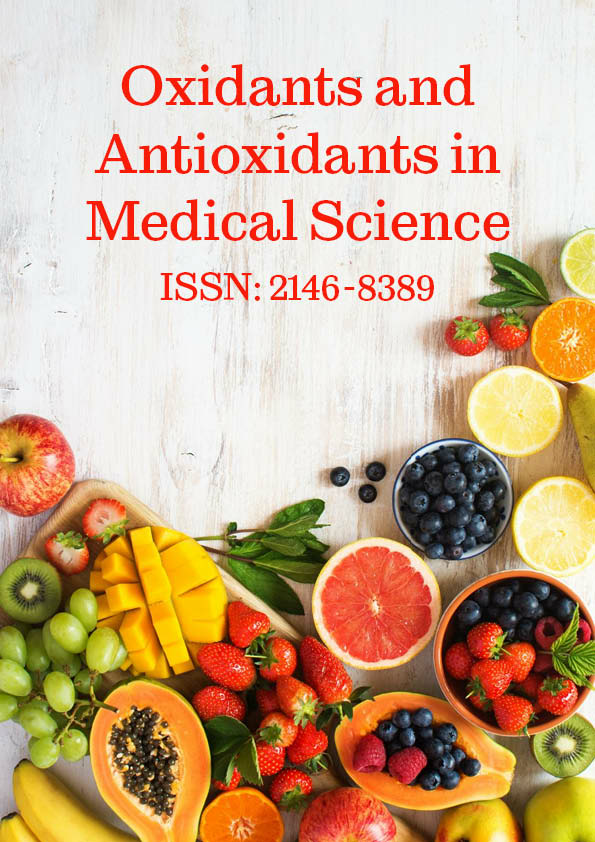Perspective - Oxidants and Antioxidants in Medical Science (2023)
The Role and Benefits of Antioxidant Rich Foods
Quiles Fernandes*Quiles Fernandes, Department of Food Science, University of Massachusetts, Massachusetts, USA, Email: Quifer4578@gmail.com
Received: 02-Jun-2023, Manuscript No. EJMOAMS-23-101670; Editor assigned: 06-Jun-2023, Pre QC No. EJMOAMS-23-101670 (PQ); Reviewed: 20-Jun-2023, QC No. EJMOAMS-23-101670; Revised: 27-Jun-2023, Manuscript No. EJMOAMS-23-101670 (R); Published: 04-Jul-2023
About the Study
Antioxidants play a crucial role in maintaining overall health and well-being. They are compounds that help protect the bodies against the damaging effects of free radicals, which are unstable molecules that can cause oxidative stress and damage to cells. Consuming a diet rich in antioxidants is essential for promoting good health and preventing various chronic diseases.
Berries
Blueberries, strawberries, raspberries, and blackberries, are excellent sources of antioxidants. They are packed with various types of antioxidants, including anthocyanins, flavonols, and vitamin C. These antioxidants help reduce inflammation, enhance brain function, and protect against heart disease and certain types of cancer. Berries are also rich in fiber, which aids in digestion and promotes a healthy gut [1].
Dark chocolate
Chocolates, particularly those with a high cocoa content (70% or more), contains significant amounts of antioxidants [2]. These antioxidants, including flavonoids and polyphenols, have been linked to numerous health benefits. Consuming dark chocolate in moderation can help lower blood pressure, improve heart health, enhance mood, and protect the skin against sun damage [3].
Leafy greens
Vegetables, such as spinach, kale, and Swiss chard, are nutritional powerhouses. They are abundant in antioxidants, including beta-carotene, vitamin C, and various flavonoids. Leafy greens help reduce the risk of chronic diseases like heart disease and certain types of cancer. They are also excellent sources of fiber, vitamins, and minerals, contributing to overall health and well-being [4].
Nuts and seeds
Almonds, walnuts, chia seeds, and flaxseeds, are rich in antioxidants, healthy fats, and fiber. They contain vitamin E, which acts as a potent antioxidant in the body. Regular consumption of nuts and seeds has been associated with a reduced risk of heart disease, improved brain function, and weight management. They also provide essential nutrients like magnesium, zinc, and omega-3 fatty acids [5].
Green tea
It is renowned for its high antioxidant content, particularly a type called catechins. These antioxidants help protect against cell damage and reduce the risk of chronic diseases, including heart disease and certain types of cancer. Drinking green tea regularly has also been linked to weight loss, improved brain function, and a lower risk of developing neurodegenerative disorders [6].
Citrus fruits
Fruits, such as oranges, lemons, grapefruits, and limes, are excellent sources of vitamin C, a potent antioxidant. Vitamin C helps boost the immune system, promotes healthy skin, and aids in collagen production. Consuming citrus fruits can reduce the risk of chronic diseases, enhance iron absorption, and improve overall cardiovascular health [7].
Tomatoes
These are rich in the antioxidant lycopene, which gives them their vibrant red color. Lycopene has been associated with a reduced risk of prostate cancer and certain cardiovascular conditions. Tomatoes are also packed with vitamin C, beta-carotene, and other antioxidants that promote skin health, protect against oxidative stress, and support eye health [8].
Turmeric
It is a spice widely used in traditional Indian cuisine. It contains a powerful antioxidant compound called curcumin, which provides numerous health benefits. Curcumin has anti-inflammatory properties and is known for its potential in reducing the risk of chronic diseases, including cancer, heart disease, and neurodegenerative disorders. It also supports digestion, boosts the immune system, and promotes healthy skin [9].
Incorporating foods rich in antioxidants into the diet is vital for maintaining good health and preventing chronic diseases. Berries, dark chocolate, leafy greens, nuts and seeds, green tea, citrus fruits, tomatoes, and turmeric are just a few examples of antioxidant-rich foods. They provide a range of health benefits, including reduced inflammation, improved heart health, enhanced brain function, and protection against certain types of cancer [10].
References
- Rusu ME, Fizeșan I, Vlase L, Popa DS. Antioxidants in Age-Related Diseases and Anti-Aging Strategies. Antioxidants 2022; 11(10):1868.
[Crossref] [Google Scholar] [PubMed]
- Leiter O, Zhuo Z, Rust R, Wasielewska JM, Grönnert L, Kowal S, et al. Selenium mediates exercise-induced adult neurogenesis and reverses learning deficits induced by hippocampal injury and aging. Cell Metab 2022; 34(3):408-423.
[Crossref] [Google Scholar] [PubMed]
- Afanas’ ev IB. Free radical mechanisms of aging processes under physiological conditions. Biogerontology. 2005 (4):283-290.
[Crossref] [Google Scholar] [PubMed]
- Alkadi H. A review on free radicals and antioxidants. Infectious Disorders-Drug Targets Infect Disord Drug Targets 2020; 20(1):16-26.
[Crossref] [Google Scholar] [PubMed]
- Lee J, Koo N, Min DB. Reactive oxygen species, aging, and antioxidative nutraceuticals. Compr Rev Food Sci Food Saf 2004 (1):21-33.
[Crossref] [Google Scholar] [PubMed]
- Gasmi A, Chirumbolo S, Peana M, Mujawdiya PK, Dadar M, Menzel A, et al. Biomarkers of senescence during aging as possible warnings to use preventive measures. Curr Med Chem 2021; 28(8):1471-1488.
[Crossref] [Google Scholar] [PubMed]
- Landete JM. Dietary intake of natural antioxidants: vitamins and polyphenols. Crit Rev Food Sci Nutr 2013; 53(7):706-721.
[Crossref] [Google Scholar] [PubMed]
- Gasmi A, Mujawdiya PK, Lysiuk R, Shanaida M, Peana M, Gasmi Benahmed A, et al. Quercetin in the Prevention and Treatment of Coronavirus Infections: A Focus on SARS-CoV-2. Pharmaceuticals 2022 ;15(9):1049.
- Shanaida M, Adamiv S, Yaremchuk O, Ivanusa I. Pharmacological study of the polyphenol-containing phytosubstance obtained from the anise hyssop herb. PhOL 2021;2:105-112
- Bjørklund G, Shanaida M, Lysiuk R, Antonyak H, Klishch I, Shanaida V et al. Selenium: an antioxidant with a critical role in anti-aging. Molecules 2022; 27(19):6613.
[Crossref] [Google Scholar] [PubMed]
Copyright: © 2023 The Authors. This is an open access article under the terms of the Creative Commons Attribution Non Commercial Share Alike 4.0 (https://creativecommons.org/licenses/by-nc-sa/4.0/). This is an open access article distributed under the terms of the Creative Commons Attribution License, which permits unrestricted use, distribution, and reproduction in any medium, provided the original work is properly cited.







